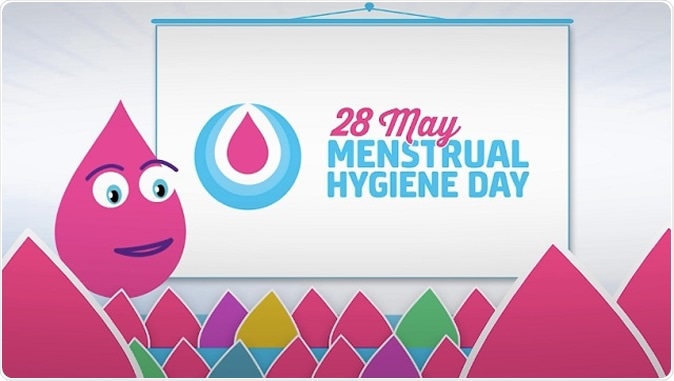The World Health Organization (WHO) declared 28th of May as the International Menstrual Hygiene day. Much of the developing and under-developed nations across the world still suffers from poor attitudes towards menstruation in young girls and women leading to taboos and myths that can range from hindrance to the girls’ normal development to life and fertility-threatening long term outcomes.

The WHO has developed the Menstrual Hygiene Day (MH Day) as a global platform that can bring together governments, private sectors and not-for-profit organizations and charities to promote the concept of “Menstrual Hygiene Management (MHM)”. The main aim of this movement is to bring forth the voices of the women and girls and build awareness regarding good menstrual hygiene practice. The WHO says on its website, “MH Day also creates opportunities for advocacy for the integration of MHM into global, national and local policies, programmes and projects.” Last year the theme for MH day was “#NoMoreLimits – Empowering Women and Girls Through Good Menstrual Hygiene”.
The WHO website speaks about the girls belonging to low and middle income countries saying that their knowledge, attitude and behaviours regarding menstruation is inadequate. Their review produced 3 key outcomes. These were that “Substantial numbers of girls in many countries have knowledge gaps and misconceptions about menstruation. This leaves them unprepared when they reach menarche and causes fear and anxiety.” In addition “Girls experience a variety of symptoms during menstruation—pain, headaches and fatigue. These symptoms combined with taboos result in their not being able to participate in household, school, or social activities.” Thie third finding was that girls from these nations are “less likely to obtain and use sanitary pads. Instead, they use materials made at home with scraps of old cloth, cotton, paper, etc.” Authors of the study write, “Lack of privacy, access to clean water and functional toilets make it harder for them to manage their periods.”
Several charities and agencies came together this year as well to observe MH day yesterday (28th of May 2019). Around the world around half of the female population menstruate. In most developing nations however there is a glaring lack of sanitation and hygiene facilities for menstruating girls and women. The prohibitive cost is another hurdle for women of poorer backgrounds to maintain good hygiene during their periods.
Agencies and charities organize awareness programmes for school girls to make them aware of the importance of good menstrual hygiene. An open dialogue in schools as well as at home around menstruation can improve MHM say experts. This year the theme for MH day is “It's Time for Action”. Experts believe that MHM should be considered to be a public health issue and the right time is now.
The United States Global Water Strategy along with USAID Water and Development Plan are working towards empowering women and girls by promoting gender equality. They teams believe that improvement in MHM can “unlock economic and educational opportunities for women and girls.” They write on their website that poor menstrual hygience can become a major constraint in “women’s and girls’ participation in education and public life.”
The USAID and Global Waters Strategy provides resources and evidence in science related to impact of good menstrual hygiene in schooling and education and also talk about “period poverty” in different nations.
USAID’s sanitation programs are in place for girls and women mainly working towards making good menstrual hygiene practices available and affordable and also destigmatizing menstruation in socially backward regions.
Related terms and studies
Definition of “period poverty” January 2019
According to the WHO/UNICEF (2012), period poverty refers to “having a lack of access to sanitary products due to financial constraints.” “The WHO UNICEPF says period poverty could be defined as -
- Women and adolescent girls being able to use clean materials to absorb or collect menstrual blood, and to change them in privacy as often as necessary throughout their menstrual period.
- Being able to use soap and water for washing the body as required and having access to safe and convenient facilities to dispose of used menstrual management materials.
- Women and girls having access to basic information about the menstrual cycle, and how to manage it with dignity without discomfort or fear.”
The WHO Sustainable Development Goals, (SDGs) Goal 4 (Ensure inclusive and equitable quality education and promote lifelong learning opportunities for all), Goal 5 (Achieve gender equality and empower all women and girls) and Goal 6 (Ensure availability and sustainable management of water and sanitation for all) can all be fulfilled if MHM is made a priority.
The United Nations
The UNFPA (United Nations Populations Fund) says that “Good menstrual health and management is a human right.” The organization reports that MHM is an “essential requirement for African countries” and also “a key element in implementing the Global Strategy for Women’s, Children’s and Adolescent’s Health 2016-2030.”
The UNFPA says that more efforts are needed to “strengthen high-level commitment, coordination and knowledge sharing” on this issue. For this their efforts at present are concentrated on Africa.
Update from India
In India MHM is positioned within the “Swachh Bharat Mission” or “Clean India mission” under which the National MHM Guidelines have been released. There are three parts of the guidelines. The first part is the main guideline followed by action guidelines and technical guidelines.
The efforts are to be concentrated on raising public awareness, breaking taboos, making better sanitation products available and affordable, safe disposal and overall opening communication regarding MHM.